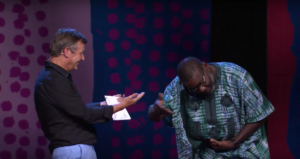When pigs fly as a metaphor for a probable Nigerian utopia is one of my favourite piece. As I read it again, I could feel the same rush of emotions come flooding in. As a young man I believed that a Nigerian pig could fly, now I understand that pigs typically don’t fly Enjoy!
Although the weekend had been unusually eventful (the instance of a beach picnic had made it so) the intangible feeling of anxiety persisted. The presentiments dragged on to Monday morning, and had by then assumed quite ominous dimensions. By Tuesday it was quite palpable, but I still couldn’t put my finger on it, until a learned friend’s remark during an informal gathering homed in on the feeling.
Shortly after joining our little group, the lawyer remarked with a feeling of obvious bewilderment, that he didn’t know “what was happening.” At that point, neither did we. But he went on and unraveled the mystery, which turned out to be an anti-climax of sorts. “NEPA has not taken light in my house for over a week now.” I was tempted to reply, “so what’s unusual about that?” but was overwhelmed by a sudden flush of catharsis.
The anxiety had dissolved from that point; looking back at the week-end, the genesis of my anxiety became clearer. I remembered watching television late at night with a subconscious feeling inside me building up to needle-point anxiety … I was anxiously anticipating NEPA’s calling card. After a couple of hours of waiting, my conscious involvement with the drama unfolding on the screen over-rode my subconscious request that NEPA visit.
Disappointed but not beaten, my masochistic sub-consciousness recoiled in anger and settled down in the pit of my stomach, brooding and waiting. And if that chance revelation had not dispelled it, no doubt, sooner or later, NEPA would.
The bathetic crash and absurdities inherent in my anecdote (quite understandably) must seem strange to some readers who haven’t been formally introduced to NEPA (National Electric Power Authority).
But legions of other readers would easily identify (and quite strongly too) with the inane feeling of anxiety described. And quite readily also, with the traumas of a possible anti-climax.
Nigerians, although sometimes quite excitable, are generally stoical people. Some people argue that it is the sheer weight of hardship that deadens their responses. Possibly true, but I think that Nigerians save their excitement and surprise for the really unusual…like when NEPA provides continuous uninterrupted supply of electricity for any 24-hour stretch of time.
The shock – no pun intended – which NEPA has generated amongst its users lately, is typical of the surprise Nigerians express when confronted with the unusual. And I might add that if NEPA continues this way, some consumers will have to be treated for genuine shock.
To understand, in any sense at all, the peculiarity of the Nigerian response to events around him requires an understanding of his expectations of people, institutions, and indeed, his country. The reason why he is more familiar with the exceptions to the rule is that the rule itself is the exception. The sense in this oxymoron is simple, Nigerians know that things can operate smoothly, but do not in Nigeria. It is permissible for other countries to operate smoothly, but certainly not here!
It is obvious now that Nigerians derive a sadomasochistic pleasure in revelling in chaos and disorder. The habit, I imagine, must have been formed at the infantile stages of early post-Independence Nigeria, during the first republic. The trauma of the civil war was (arguably), a strong contributing factor, but after it, at the onset of puberty, the incontinence of the oil-boom in the early to mid-seventies certainly compounded it.
The adolescent stages of late military rule, and early second republic did nothing to curb the habit. And now, after the fiasco of the second republic, at a mature twenty-four years, we still prefer to venture forth, in pursuit of mediocrity. Some people strongly argue that the amalgamation of the then Northern and Southern protectorates in 1914 by the British was the exceptional circumstance that gave birth to our perversion of always preferring the unusual.
Perhaps so, but irrespective of origins, there must be unanimity in the opinion that we seem to prefer aberrations, and at best, compromises…but never ‘the best possible’. And we are all too ready to suffer under the yoke of bungling incompetence and injustice, since, to us, that is the rule. The antithetical examples of efficiency and egalitarian justice are, to a certain degree, welcome, but then that would be an exception…wouldn’t it? As would a government with a benevolent and truly nationalistic outlook, founded on a solid and morally unimpeachable foundation. Or a Nigeria free of ethnic paranoia. Or a quietly efficient government whose physical absence in the day-to-day life of its citizens is a testimony to its behind-the-scenes efficiency. Or clean water, good food, good housing, and good education for all. Or even an uninterrupted supply of electricity.
All these, though improbable, are quite possible and occasionally, the pig does fly, but few people take notice, because its flight is usually very brief indeed. And the few that notice blink disbelievingly because the urge not to believe the unusual (in this country) is too strong.
Those flashes of competence leave a great many of us befuddled, and anxiously waiting for the anti-climax (which usually is punctual).
But ultimately, we hope that Nigeria will develop to a level where everything works, and pigs are kept in perpetual flight.
The Punch,
Saturday, May 26, 1984



